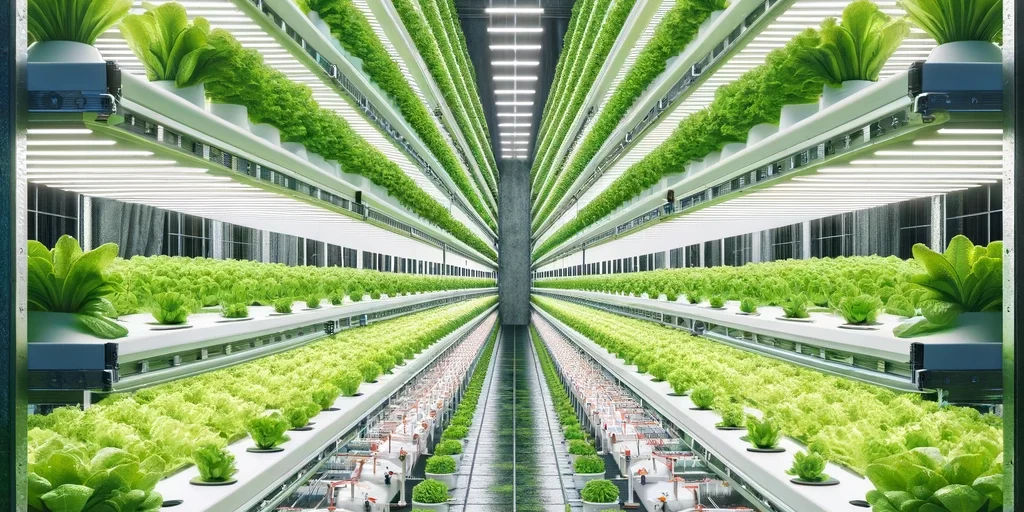In modern agriculture, vertical farming stands out as a beacon of innovation, promising to revolutionise how we grow our food in urban environments.
Vertical farming presents a sustainable solution to food production challenges because it can produce crops in stacked layers, often within controlled environments.
However, the heart of this agricultural marvel lies in something seemingly simple yet profoundly critical: water. The “Clean Water, Healthy Crops” adage encapsulates why water disinfection is paramount in vertical farming systems.
The Lifeline of Vertical Farming
Water is the lifeline of all forms of agriculture, and vertical farming is no exception. In these systems, water nourishes the plants and serves as a vehicle for delivering essential nutrients directly to their roots.
Given the closed-loop nature of many vertical farms, the same water can be recirculated through the system multiple times, enhancing water efficiency and sustainability. However, this recirculation poses a significant risk of pathogen build-up, leading to plant diseases and reduced crop yields. Enter the critical role of water disinfection.
The Perils of Pathogens
Pathogens such as bacteria, viruses, and fungi can thrive in the densely populated environments of vertical farms if not correctly managed. These microorganisms can be introduced through various means, including contaminated seeds, water sources, and air.
Once established, they can spread rapidly, endangering entire crops. Diseases such as Pythium root rot and Fusarium wilt, both of which thrive in moist conditions, can devastate vertical farming operations. This is where the importance of disinfection comes into sharp focus.
The Shield of Disinfection
Disinfection acts as a shield, protecting crops from the invisible threat of pathogens. By implementing effective water disinfection strategies, vertical farmers can ensure that their plants receive only clean, safe water, free from harmful microorganisms.
A Healthy Ecosystem for Vertical Farming
Beyond protecting plants, clean water contributes to the overall health of the vertical farming ecosystem. It ensures beneficial microorganisms thrive, which are crucial in plant growth and soil health.
These beneficial microbes can outcompete harmful pathogens, further enhancing crop resilience. Moreover, clean water prevents the build-up of biofilms in irrigation systems, ensuring efficient water flow and nutrient delivery to each plant.
Chlorine Dioxide Solutions from Scotmas
Scotmas has developed Chlorine Dioxide (ClO2) solutions ideal for vertical farm operators looking to ensure the safety and purity of their plants’ water supply. Chlorine dioxide is a highly effective disinfectant that can eliminate a broad spectrum of pathogens while being gentle on plants and the environment.
Scotmas’ solutions are easy to use and can be integrated into existing vertical farming systems, providing operators with a reliable tool for maintaining water quality and crop health. With our chlorine dioxide solutions, vertical farm operators can have peace of mind knowing that their plants are receiving the clean water they need to thrive and produce healthy, high-quality crops.
The Bigger Picture
The importance of water disinfection in vertical farming transcends individual operations. It is crucial in the broader context of sustainable agriculture and food security. By ensuring the health and productivity of crops, clean water practices in vertical farming contribute to the resilience of food systems, particularly in urban areas where traditional farming space is limited. This is especially pertinent as the global population grows and cities become denser.
Cornerstone of Sustainable
The mantra “Clean Water, Healthy Crops” encapsulates a fundamental principle of vertical farming. Water disinfection is not just a technical necessity; it’s a cornerstone of sustainable, productive agriculture in the vertical context.
As we embrace innovative farming techniques, foundational elements like water purity become increasingly apparent. Through diligent water management and disinfection, vertical farming can continue to offer promising solutions to some of our most pressing food production challenges, ensuring a future where everyone has access to fresh, healthy produce.
Contact the Scotmas team today for more information on how our chlorine dioxide solutions can improve your vertical farming operations.






